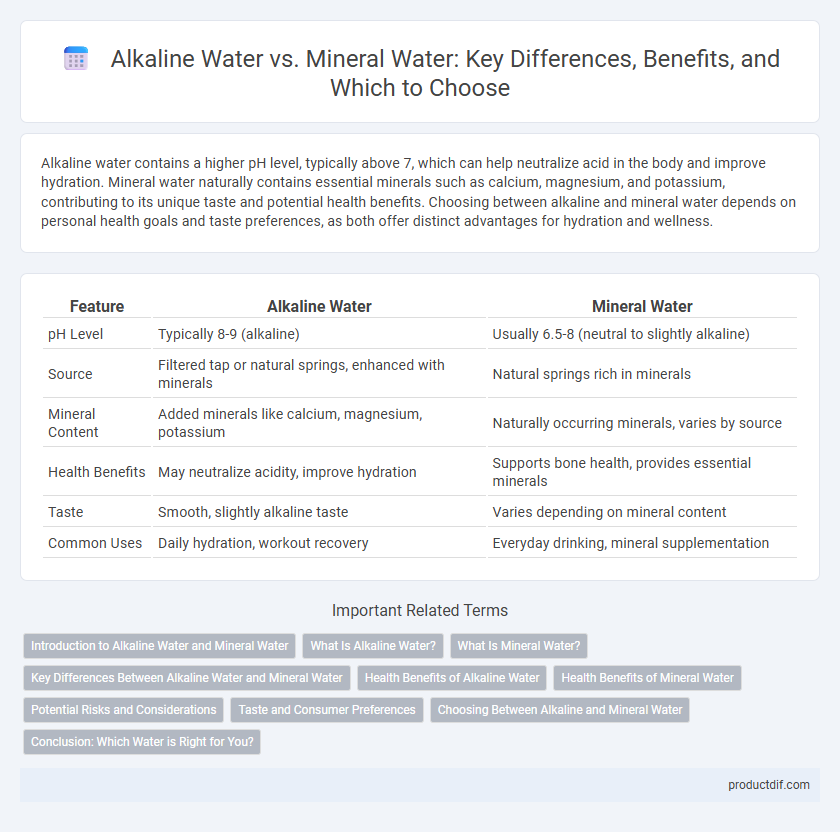Alkaline water contains a higher pH level, typically above 7, which can help neutralize acid in the body and improve hydration. Mineral water naturally contains essential minerals such as calcium, magnesium, and potassium, contributing to its unique taste and potential health benefits. Choosing between alkaline and mineral water depends on personal health goals and taste preferences, as both offer distinct advantages for hydration and wellness.
Table of Comparison
| Feature | Alkaline Water | Mineral Water |
|---|---|---|
| pH Level | Typically 8-9 (alkaline) | Usually 6.5-8 (neutral to slightly alkaline) |
| Source | Filtered tap or natural springs, enhanced with minerals | Natural springs rich in minerals |
| Mineral Content | Added minerals like calcium, magnesium, potassium | Naturally occurring minerals, varies by source |
| Health Benefits | May neutralize acidity, improve hydration | Supports bone health, provides essential minerals |
| Taste | Smooth, slightly alkaline taste | Varies depending on mineral content |
| Common Uses | Daily hydration, workout recovery | Everyday drinking, mineral supplementation |
Introduction to Alkaline Water and Mineral Water
Alkaline water contains a higher pH level, usually above 7, which helps neutralize acid in the body and is often enriched with minerals like calcium, magnesium, and potassium. Mineral water originates from a natural spring and contains dissolved minerals such as calcium, magnesium, and bicarbonate, contributing to its distinct taste and potential health benefits. Both types of water offer unique hydration options, with alkaline water promoting acid-base balance and mineral water providing essential trace minerals.
What Is Alkaline Water?
Alkaline water is water with a higher pH level, typically above 7, achieved through natural minerals or ionization processes. It contains essential minerals like calcium, magnesium, and potassium that contribute to its alkalinity and potential health benefits. This type of water is believed to help neutralize acid in the bloodstream and improve hydration compared to regular drinking water.
What Is Mineral Water?
Mineral water is naturally sourced from underground springs and contains essential minerals such as calcium, magnesium, and potassium, which contribute to its distinctive taste and health benefits. Unlike alkaline water, mineral water's pH can vary depending on its geographical origin and mineral content. It is often valued for its natural mineral composition and is commonly bottled directly at the source to preserve its purity.
Key Differences Between Alkaline Water and Mineral Water
Alkaline water typically has a pH level above 7, often around 8 or 9, and contains added minerals like calcium, magnesium, and potassium to increase alkalinity. Mineral water naturally occurs from springs and contains a diverse range of minerals such as calcium, magnesium, sodium, and sulfate, influencing its unique taste and health benefits. The key difference lies in alkaline water's engineered pH level versus mineral water's naturally balanced mineral content derived from geological sources.
Health Benefits of Alkaline Water
Alkaline water, with a higher pH level typically between 8 and 9, helps neutralize acid in the bloodstream, promoting better hydration and potentially reducing acid reflux symptoms. It contains essential minerals such as calcium, magnesium, and potassium, which support bone health and improve metabolic functions. Studies suggest that alkaline water's antioxidant properties may help reduce oxidative stress and inflammation, contributing to enhanced overall wellness.
Health Benefits of Mineral Water
Mineral water is rich in essential minerals such as calcium, magnesium, and potassium, which support bone health, cardiovascular function, and electrolyte balance. Its natural mineral content can improve hydration and promote better digestion compared to alkaline water, which typically lacks these beneficial nutrients. Consuming mineral water regularly may aid in reducing the risk of hypertension and boost overall metabolic health.
Potential Risks and Considerations
Alkaline water, with its higher pH levels, can disrupt the body's natural acid-base balance if consumed excessively, potentially leading to metabolic alkalosis and gastrointestinal issues. Mineral water, rich in essential minerals like calcium, magnesium, and potassium, may pose risks for individuals with kidney problems or those on sodium-restricted diets due to its mineral content. Both types require mindful consumption, especially for people with underlying health conditions, to avoid adverse effects related to mineral imbalances or pH alterations.
Taste and Consumer Preferences
Alkaline water typically has a smoother, slightly sweeter taste due to its higher pH and mineral content, which some consumers find more refreshing compared to the crisp, naturally occurring minerals in mineral water that give it a distinct, often sharper flavor. Consumer preferences vary widely, with alkaline water favored by those seeking perceived health benefits and a milder taste, while mineral water appeals to enthusiasts who appreciate its natural mineral profile and authenticity. Market research shows a growing trend toward alkaline water among health-conscious individuals, though mineral water maintains strong loyalty among traditional taste purists.
Choosing Between Alkaline and Mineral Water
Choosing between alkaline water and mineral water hinges on specific health benefits and mineral content preferences. Alkaline water, with a higher pH level typically around 8-9, may help neutralize acidity in the body, while mineral water offers essential minerals like calcium, magnesium, and potassium naturally sourced from springs. For optimal hydration and mineral intake, consumers should consider their dietary needs and water source purity when selecting between these two beverage options.
Conclusion: Which Water is Right for You?
Choosing between alkaline water and mineral water depends on individual health needs and taste preferences; alkaline water offers a higher pH level that may aid in neutralizing acid in the body, while mineral water provides essential minerals like calcium, magnesium, and potassium. Athletes or those seeking hydration with electrolytes might benefit more from mineral water, whereas people looking to balance body pH or reduce acid reflux could consider alkaline water. Evaluating your specific health goals and consulting with a healthcare professional can help determine the best option.
Alkaline Water vs Mineral Water Infographic

 productdif.com
productdif.com